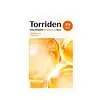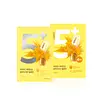What's inside
What's inside
 Key Ingredients
Key Ingredients

 Benefits
Benefits

 Ingredients Side-by-side
Ingredients Side-by-side

Water
Skin ConditioningGlycerin
HumectantButylene Glycol
HumectantNiacinamide
Smoothing1,2-Hexanediol
Skin ConditioningGlycereth-26
HumectantPanthenol
Skin Conditioning3-O-Ethyl Ascorbic Acid
Skin ConditioningAdenosine
Skin ConditioningAllantoin
Skin ConditioningTocopherol
AntioxidantGlutathione
Ascorbyl Glucoside
AntioxidantAscorbyl Palmitate
AntioxidantAscorbic Acid
AntioxidantAscorbyl Tetraisopalmitate
AntioxidantTripeptide-1
Skin ConditioningHydrolyzed Hyaluronic Acid
HumectantCeramide NP
Skin ConditioningCaprylic/Capric Triglyceride
MaskingOctyldodecanol
EmollientC14-22 Alcohols
Emulsion StabilisingAcrylates/C10-30 Alkyl Acrylate Crosspolymer
Emulsion StabilisingEthylhexylglycerin
Skin ConditioningSodium Acetylated Hyaluronate
HumectantSodium Hyaluronate
HumectantSodium Hyaluronate Crosspolymer
HumectantTromethamine
BufferingGlyceryl Acrylate/Acrylic Acid Copolymer
HumectantC12-20 Alkyl Glucoside
EmulsifyingPvm/Ma Copolymer
Emulsion StabilisingHydrogenated Lecithin
EmulsifyingDisodium EDTA
Polyglyceryl-10 Myristate
Skin ConditioningPentylene Glycol
Skin ConditioningIsopentyldiol
Humectant2,3-Butanediol
HumectantHydrolyzed Sodium Hyaluronate
Skin ConditioningPolyglyceryl-4 Oleate
EmulsifyingSodium Stearoyl Glutamate
CleansingArginine
MaskingCarbomer
Emulsion StabilisingProline
Skin ConditioningGlucose
HumectantXanthan Gum
EmulsifyingWater, Glycerin, Butylene Glycol, Niacinamide, 1,2-Hexanediol, Glycereth-26, Panthenol, 3-O-Ethyl Ascorbic Acid, Adenosine, Allantoin, Tocopherol, Glutathione, Ascorbyl Glucoside, Ascorbyl Palmitate, Ascorbic Acid, Ascorbyl Tetraisopalmitate, Tripeptide-1, Hydrolyzed Hyaluronic Acid, Ceramide NP, Caprylic/Capric Triglyceride, Octyldodecanol, C14-22 Alcohols, Acrylates/C10-30 Alkyl Acrylate Crosspolymer, Ethylhexylglycerin, Sodium Acetylated Hyaluronate, Sodium Hyaluronate, Sodium Hyaluronate Crosspolymer, Tromethamine, Glyceryl Acrylate/Acrylic Acid Copolymer, C12-20 Alkyl Glucoside, Pvm/Ma Copolymer, Hydrogenated Lecithin, Disodium EDTA, Polyglyceryl-10 Myristate, Pentylene Glycol, Isopentyldiol, 2,3-Butanediol, Hydrolyzed Sodium Hyaluronate, Polyglyceryl-4 Oleate, Sodium Stearoyl Glutamate, Arginine, Carbomer, Proline, Glucose, Xanthan Gum
Water
Skin ConditioningMethylpropanediol
SolventNiacinamide
SmoothingPEG/PPG-17/6 Copolymer
SolventCoptis Japonica Root Extract
Skin Conditioning1,2-Hexanediol
Skin ConditioningHydroxyacetophenone
AntioxidantHydroxyethyl Urea
HumectantIsopentyldiol
HumectantMethyl Gluceth-20
HumectantCarbomer
Emulsion StabilisingAllantoin
Skin ConditioningSodium Ascorbyl Phosphate
AntioxidantGlutathione
Hydrogenated Lecithin
EmulsifyingPEG-60 Hydrogenated Castor Oil
EmulsifyingXanthan Gum
EmulsifyingAdenosine
Skin ConditioningEthylhexylglycerin
Skin ConditioningSodium Polyacrylate
AbsorbentButylene Glycol
HumectantCentella Asiatica Extract
CleansingDisodium EDTA
Hydroxyethylcellulose
Emulsion StabilisingMethyl Diisopropyl Propionamide
MaskingPolyglutamic Acid
Skin ConditioningProtease
ExfoliatingCeramide NP
Skin ConditioningAscorbic Acid
AntioxidantArbutin
AntioxidantBisabolol
MaskingHyaluronic Acid
HumectantWater, Methylpropanediol, Niacinamide, PEG/PPG-17/6 Copolymer, Coptis Japonica Root Extract, 1,2-Hexanediol, Hydroxyacetophenone, Hydroxyethyl Urea, Isopentyldiol, Methyl Gluceth-20, Carbomer, Allantoin, Sodium Ascorbyl Phosphate, Glutathione, Hydrogenated Lecithin, PEG-60 Hydrogenated Castor Oil, Xanthan Gum, Adenosine, Ethylhexylglycerin, Sodium Polyacrylate, Butylene Glycol, Centella Asiatica Extract, Disodium EDTA, Hydroxyethylcellulose, Methyl Diisopropyl Propionamide, Polyglutamic Acid, Protease, Ceramide NP, Ascorbic Acid, Arbutin, Bisabolol, Hyaluronic Acid
 Reviews
Reviews

Ingredients Explained
These ingredients are found in both products.
Ingredients higher up in an ingredient list are typically present in a larger amount.
1,2-Hexanediol is a synthetic liquid and another multi-functional powerhouse.
It is a:
- Humectant, drawing moisture into the skin
- Emollient, helping to soften skin
- Solvent, dispersing and stabilizing formulas
- Preservative booster, enhancing the antimicrobial activity of other preservatives
Adenosine is in every living organism. It is one of four components in nucleic acids that helps store our DNA.
Adenosine has many benefits when used. These benefits include hydrating the skin, smoothing skin, and reducing wrinkles. Once applied, adenosine increases collagen production. It also helps with improving firmness and tissue repair.
Studies have found adenosine may also help with wound healing.
In skincare products, Adenosine is usually derived from yeast.
Learn more about AdenosineAllantoin is a soothing ingredient known for its protective and moisturizingg properties. Because of this, it is often added to products with strong active ingredients.
Studies show higher concentrations of this ingredient can promote wound healing.
Though it can be derived from the comfrey plant, allantoin is produced synthetically for cosmetic products to ensure purity.
Learn more about AllantoinAscorbic Acid is is pure Vitamin C. This form makes up the largest amount of vitamin C found naturally in our skin.
Not only is vitamin C great for your overall health and immune system, it also has plenty of benefits on your skin.
Vitamin C is best used for brightening skin. It improves dark spots, acne scars, and hyperpigmentation. This is because it blocks the process of skin darkening when exposed to UV.
Remember: Vitamin C should not replace sunscreen!
Your skin uses vitamin C to build collagen. Collagen is one key component in having a strong skin barrier and plump skin. Vitamin C also plays a role in regulating collagen, thus making it effective in improving wrinkles and fine lines.
Ascorbic acid shows potent antioxidant activity. As an antioxidant, it helps fight free-radicals. Free-radicals are molecules that may damage your skin cells. These antioxidants also protect skin against UV damage.
The best formulations include Vitamin E and/or ferulic acid. These two ingredients help stabilize and provide a boost in the benefits of ascorbic acid. This is because ascorbic acid becomes unstable when exposed to UV and air. In fact, you can tell your ascorbic acid has oxidized when it turns an orange-yellow color.
Ascorbic acid is generally compatible with other ingredients. However, using ascorbic acid with other active ingredients might cause irritation. Two ingredients: copper ions and benzoyl peroxide, will inactivate ascorbic acid completely.
Read more about other types of Vitamin C:
Foods rich with vitamin C include oranges, strawberries, broccoli, bell peppers, and more. When consuming Vitamin C, your skin receives a portion of the nutrients.
Learn more about Ascorbic AcidButylene Glycol (or BG) is used within cosmetic products for a few different reasons:
Overall, Butylene Glycol is a safe and well-rounded ingredient that works well with other ingredients.
Though this ingredient works well with most skin types, some people with sensitive skin may experience a reaction such as allergic rashes, closed comedones, or itchiness.
Learn more about Butylene GlycolCarbomer is a polymer of acrylic acid. Its main role is to create a gel consistency.
A high amount of carbomer can cause pilling or balling up of products. Don't worry, most products contain 1% or less of carbomer.
Ceramide NP is a type of ceramide and formally known as ceramide 3.
Ceramides are intercellular lipids naturally found in our skin that bonds dead skin cells together to create a barrier. They are known for their ability to hold water and thus are a great ingredient for dry skin.
Ceramides are an important building block for our skin barrier. A stronger barrier helps the skin look more firm and hydrated. By bolstering the skin ceramides act as a barrier against irritating ingredients. This can help with inflammation as well.
If you would like to eat ceramides, sweet potatoes contain a small amount.
Read more about other common types of ceramides here:
Ceramide AP
Ceramide EOP
Disodium EDTA plays a role in making products more stable by aiding other preservatives.
It is a chelating agent, meaning it neutralizes metal ions that may be found in a product.
Disodium EDTA is a salt of edetic acid and is found to be safe in cosmetic ingredients.
Learn more about Disodium EDTAEthylhexylglycerin (we can't pronounce this either) is commonly used as a preservative and skin softener. It is derived from glyceryl.
You might see Ethylhexylglycerin often paired with other preservatives such as phenoxyethanol. Ethylhexylglycerin has been found to increase the effectiveness of these other preservatives.
Glutathione is an antioxidant naturally found in our bodies. It is made up of three amino acids: glycine, cysteine, and glutamic acid.
As an antioxidant, it prevents oxidative damage to parts of our cell.
While glutathione is said to help with fading dark spots, the results from research are inconclusive. Further studies are needed. With that said, gluthatione has been shown to protect our skin from UV-B induced damage.
This ingredient is naturally occurring in plants, animals, fungi, and some bacteria.
Learn more about GlutathioneHydrogenated Lecithin is created from the hydrogenation of lecithin (a group of phospholipids). Hydrogenation is a chemical reaction between hydrogen and another element.
This ingredient is an emollient and emulsifier. As an emollient, it helps soften skin by trapping moisture within. As an emulsifier, it prevents oil and water ingredients from separating.
Isopentyldiol is a synthetic solvent, humectant, and emollient.
Humectants have the ability to attract and hold water while emollients create a thin film to prevent water from evaporating. This combination keeps your skin and hair soft and hydrated. Plus, isopentyldiol does not leave a sticky feeling behind.
As a surfactant, isopentyldiol is a hydrotrope. Hydrotropes help surfactants (cleansing agents) dissolve into water.
According to the manufacturer, using this ingredient with sorbitol boosts skin hydration and helps close cuticles of damaged hair.
This ingredient is water-soluble.
Learn more about IsopentyldiolNiacinamide is a multitasking form of vitamin B3 that strengthens the skin barrier, reduces pores and dark spots, regulates oil, and improves signs of aging.
And the best part? It's gentle and well-tolerated by most skin types, including sensitive and reactive skin.
You might have heard of "niacin flush", or the reddening of skin that causes itchiness. Niacinamide has not been found to cause this.
In very rare cases, some individuals may not be able to tolerate niacinamide at all or experience an allergic reaction to it.
If you are experiencing flaking, irritation, and dryness with this ingredient, be sure to double check all your products as this ingredient can be found in all categories of skincare.
When incorporating niacinamide into your routine, look out for concentration amounts. Typically, 5% niacinamide provides benefits such as fading dark spots. However, if you have sensitive skin, it is better to begin with a smaller concentration.
When you apply niacinamide to your skin, your body converts it into nicotinamide adenine dinucleotide (NAD). NAD is an essential coenzyme that is already found in your cells as "fuel" and powers countless biological processes.
In your skin, NAD helps repair cell damage, produce new healthy cells, support collagen production, strengthen the skin barrier, and fight environmental stressors (like UV and pollution).
Our natural NAD levels start to decline with age, leading to slower skin repair, visible aging, and a weaker skin barrier. By providing your skin niacinamide, you're recharging your skin's NAD levels. This leads to stronger, healthier, and younger looking skin.
Another name for vitamin B3 is nicotinamide. This vitamin is water-soluble and our bodies don't store it. We obtain Vitamin B3 from either food or skincare. Meat, fish, wheat, yeast, and leafy greens contain vitamin B3.
The type of niacinamide used in skincare is synthetically created.
Learn more about NiacinamideWater. It's the most common cosmetic ingredient of all. You'll usually see it at the top of ingredient lists, meaning that it makes up the largest part of the product.
So why is it so popular? Water most often acts as a solvent - this means that it helps dissolve other ingredients into the formulation.
You'll also recognize water as that liquid we all need to stay alive. If you see this, drink a glass of water. Stay hydrated!
Learn more about WaterXanthan gum is used as a stabilizer and thickener within cosmetic products. It helps give products a sticky, thick feeling - preventing them from being too runny.
On the technical side of things, xanthan gum is a polysaccharide - a combination consisting of multiple sugar molecules bonded together.
Xanthan gum is a pretty common and great ingredient. It is a natural, non-toxic, non-irritating ingredient that is also commonly used in food products.
Learn more about Xanthan Gum